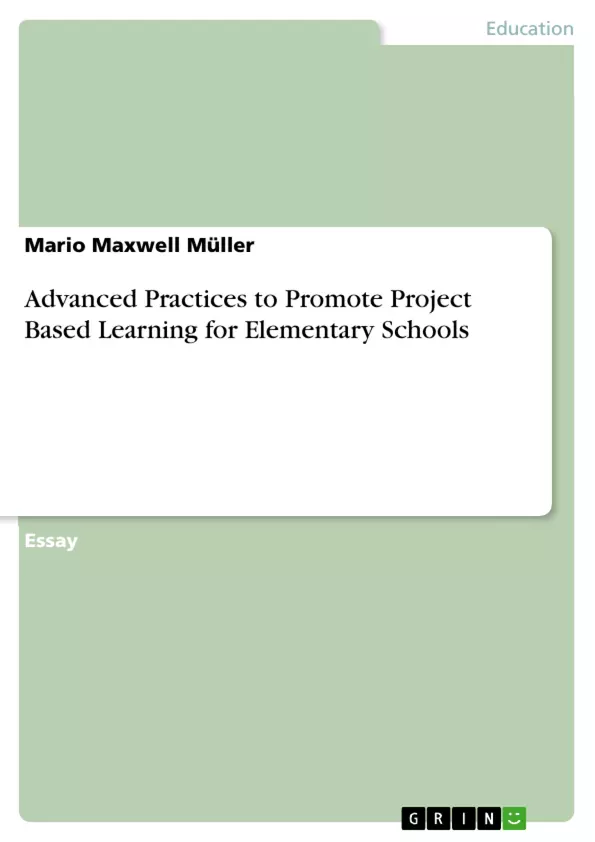In the following essay, the author will discuss the current practices used to promote Project Based Learning, to enhance the knowledge and understanding of student's ability to integrate Science, Technology, Engineering and Mathematics in Elementary School. Instructional approaches can vary from getting students to work within a group setting to focussing on cooperative learning and collaboration. Here students are given opportunities to share their ideas, concepts, understanding and content within a diverse multicultural setting within an international school. Educators will greatly benefit by employing strategies that encourage motivation, excitement, cooperation and the correct attitude to conclude projects that will showcase each student's participation.
Inhaltsverzeichnis (Table of Contents)
- Introduction
- The curriculum topic
- Project-based learning
- Analysis of the current approach to teaching STEM in the Primary and Middle School
Zielsetzung und Themenschwerpunkte (Objectives and Key Themes)
This essay examines the current practices utilized to promote STEM education in primary and middle school, particularly focusing on the implementation of Project-Based Learning (PBL) as an instructional approach. The goal is to demonstrate how PBL empowers students to become lifelong learners, encouraging natural inquiry and fostering collaboration, idea sharing, and critical thinking in relation to STEM concepts. The essay also aims to showcase how PBL effectively integrates STEM disciplines within the educational landscape.
- Project-Based Learning as a strategy for promoting STEM education
- The role of student engagement and collaboration in PBL
- The importance of integrating STEM across different disciplines
- The application of PBL in a real-world context
- The impact of PBL on student learning outcomes
Zusammenfassung der Kapitel (Chapter Summaries)
- Introduction: The introduction outlines the essay's objectives and the importance of Project-Based Learning (PBL) as an effective method for fostering STEM education. It highlights the importance of equipping students with the skills and knowledge necessary to become lifelong learners, natural inquirers, and active collaborators in STEM-related fields.
- The curriculum topic: This section delves into the specific curriculum topic of exploring sound energy within the context of STEM. It outlines how the International Baccalaureate (IB) curriculum encourages students to connect their learning within a global context, while providing clear guidelines, support, and motivation for exploring STEM opportunities. The section also highlights the objectives of this curriculum topic, which involve students understanding the creation of sound energy through exploring their musical talents and skills in the classroom.
- Project-based learning: This section examines the implementation of Project-Based Learning (PBL) as an instructional approach. It explains how PBL encourages students to develop a strong understanding of Science, Technology, Engineering, and Mathematics (STEM) through hands-on activities, research, and collaboration. The section also underscores the importance of fostering student inquiry, critical thinking skills, and engagement through group work and technology-based projects. It emphasizes the need for students to become innovators and use their knowledge to create and showcase their projects.
- Analysis of the current approach to teaching STEM in the Primary and Middle School: This section provides an in-depth analysis of current practices for teaching STEM in primary and middle schools, particularly focusing on the use of cooperative learning. It explains how educators can effectively utilize various instructional approaches, such as think-pair-share, peer instruction, and jigsaw activities, to create engaging and collaborative learning environments for students.
Schlüsselwörter (Keywords)
The core concepts explored in this essay revolve around the effective integration of STEM disciplines through Project-Based Learning (PBL) in primary and middle school education. Key terms include Project-Based Learning, STEM education, cooperative learning, student engagement, collaboration, and inquiry-based learning. The essay focuses on the practical application of PBL as a strategic approach to enhance student learning outcomes and foster a lifelong love of learning within the STEM domain.
- Quote paper
- Mario Maxwell Müller (Author), 2022, Advanced Practices to Promote Project Based Learning for Elementary Schools, Munich, GRIN Verlag, https://www.grin.com/document/1282637



